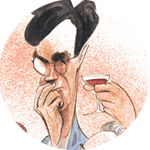 |
|
| Everybody's a critic
Thomas Frank, AM’89, PhD’94 Beginning with The Baffler—a semiannual journal he founded with several friends at the University of Virginia and brought with him to grad school in history at Chicago—Thomas Frank has produced cultural criticism from the far Left. Watching the continually blurred line between U.S. business and culture, he writes as a cynic compelled to point out, with equal parts alarm and style, that the emperor has no clothes. Education. The 1988 U-Va. grad did his doctoral dissertation on 1960s advertising. Published by the U of C Press in 1997, The Conquest of Cool: Business Culture, Counterculture, and the Rise of Hip Consumerism became what so few dissertations are: a bestseller. Backstory. “I was a conservative when I was in junior high school and high school. I believed it,” Tom Frank admitted to the Wisconsin State Journal in October 2003. “I watched that Milton Friedman documentary on PBS [Free to Choose]. A lot of people became conservative watching that show. And as an ideology, it fit together really well. But it did the classic thing that ideologies are supposed to do: it justified your position in life.” Opening salvo. As might be expected from a publication that shared office space and a Macintosh computer with Chicago’s WHPK radio station (where Frank’s time as station manager left him impressed with the sheer passion the deejays put into their liner notes), The Baffler first gained attention by smelling a rat, doing a little investigative reporting, and pointing out that a fast one had been pulled on the New York Times: an article explaining Seattle grunge-speak turned out to be based on a source who’d made up her examples as a put-on. After getting the media’s ear The Baffler, which took as it slogan “The Journal that Blunts the Cutting Edge,” continued to pursue its founding mission, “to restore a sense of outrage and urgency to the literature of the Left and simultaneously to unmask the pretensions of the lifestyle liberals.” Guiding lights. The object of Frank’s outrage was, and remains, big business’s pervasive influence on contemporary culture— an influence so complete, he believes, that it goes largely unquestioned. In The Conquest of Cool, a study of menswear and advertising in the 1960s, he argues that the decade’s “counterculture” was less societal transformation than adaptation to late capitalism: “The countercultural style has become a permanent fixture on the American scene, impervious to the angriest assaults of cultural and political conservatives, because it so conveniently and efficiently transforms the myriad petty tyrannies of economic life—all the complaints about coformity, oppression, bureaucracy, meaninglessness, and the disappearance of individualism that became virtually a national obsession during the 1950s—into rationales for consuming. No longer would Americans buy to fit in or impress the Joneses, but to demonstrate that they were wise to the game, to express their revulsion with the artifice and conformity of consumerism.” An admirer of H. L. Mencken—for the Sage of Baltimore’s smartly suspicious cynicism, not his politics—Frank styled The Baffler after Mencken’s magazines, The Smart Set and The American Mercury. Frank’s latest collection, Boob Jubilee, borrows its title from “booboisie,” Mencken’s term of nonendearment for the unthinking masses. The journal’s Issue No. 16, “Nascar, How Proud a Sound,” embarks on an equally Menckenesque enterprise, revealing “the shocking breadth of American ignorance.” Short list. Commodify Your Dissent: Salvos from The Baffler, editor (W. W. Norton, 1997); One Market Under God: Extreme Capitalism, Market Populism, and the End of Economic Democracy (Doubleday, 2000); Boob Jubilee: The Cultural Politics of the New Economy, editor (W. W. Norton, 2003); What’s the Matter with Kansas? How Conservatives Won the Heart of America (Metropolitan Books, June 2004).
|
|
phone: 773/702-2163 | fax: 773/702-8836 | uchicago-magazine@uchicago.edu

